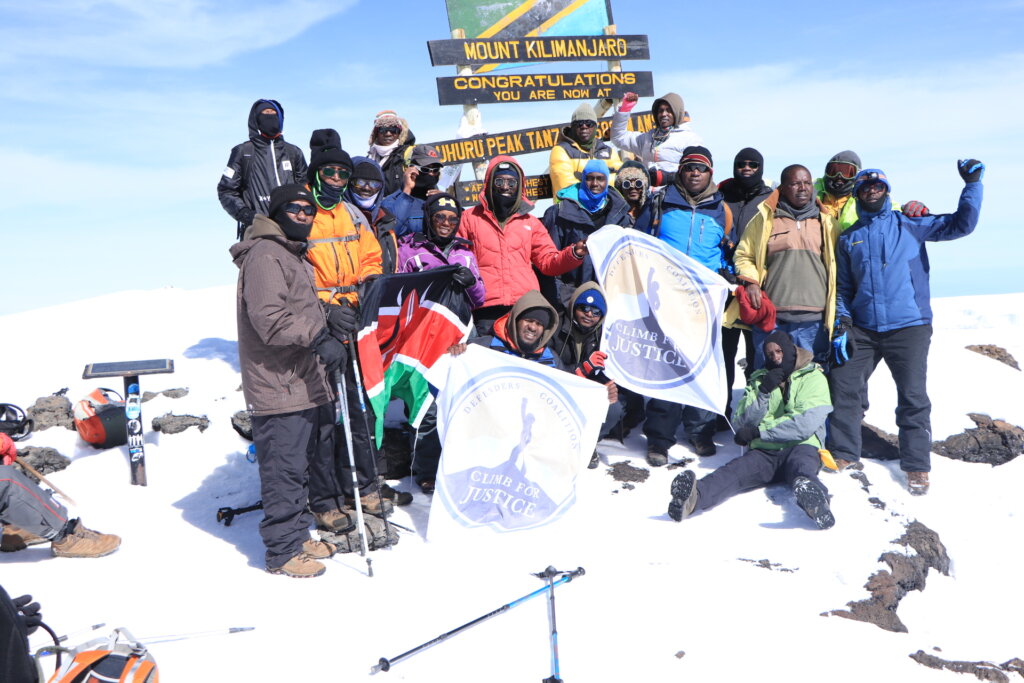PRESS RELEASE: PROTECTORS TURNED KILLERS: A Police Service Gone Rogue: Torture, Extra Judicial Killings and Enforced Disappearances
2nd May 2021 For Immediate Release: We, the Police Reforms Working Group-Kenya (PRWG-Kenya), are alarmed and utterly dismayed by the illegal arrest, detention, and killing of Collins, a youth from Mathare in Nairobi County on 29th April 2021. This is the latest killing of a Mathare youth allegedly by a most rogue police officer known […]
CALL FOR CONSULTANCY: TRAINING ON MONITORING, DOCUMENTATION AND REPORTING FROM A GENDER PERSPECTIVE.
Introduction: The Defenders Coalition, which is the national coalition of human rights defenders in Kenya, is a national organization incorporated in the Republic of Kenya as a Trust. Its mission is to champion the safety, security and wellbeing of Human Rights Defenders (HRDs). Established in 2007, Defenders Coalition is the only national organisation that works […]
Mutemi Kiama Update
Mutemi returned to court today 20th April for the mention of the case. The ODPP ambushed the court with a proposal to withdraw the matter under Section 87. The magistrate sought for reasons which were not forthcoming. The defense opposed the ODPP application . The magistrate concurred with the defense and made the following orders. […]
ALARM OVER CRIMINALITY WITHIN THE SECURITY SECTOR
PRESS STATEMENT TO ALL EDITORS, The Police Reforms Working Group has taken note of a documentary aired on Citizen TV on April 18th 2021 christened “Guns Galore”. The exposé revealed how rogue police officers promote crime by hiring their police operating gears: guns, uniforms, bulletproof vests, and handcuffs to criminals for as low as Ksh […]
Defenders Coalition, ARTICLE 19 Eastern Africa and Amnesty Kenya strongly condemn the arrest and detention of Edwin Mutemi wa Kiama. We also condemn the Court’s punitive bail terms.
8th April 2021 For Immediate Release Kiama, an activist, was arrested by 5 police officers during odd hours of the evening on 6 April for publishing infographics and joining the #IMFStopLoaningKenya conversation on Twitter. On 7 April, the DCI filed a miscellaneous application to detain Kiama for 14 days pending investigations on alleged contravention of […]
Defenders Coalition 2020 Annual Report
Read Our Annual Report Here Our story for 2020 is not one of drastic changes to the world we live in, but of our response to ongoing challenges we face. Time and again we saw with adept demonstration how resilient, creative, and adaptable human rights defenders can be in the face of repression and mutation […]
PERCEPTION SURVEY REPORT : THE IMPACT OF COMMUNICATION SURVEILLANCE ON HUMAN RIGHTS DEFENDERS IN KENYA
SUMMARY OF THE UPDATED REPORT ON THE IMPACT OF COMMUNICATION SURVEILLANCE ON HUMAN RIGHTS DEFENDERS IN KENYA Read Full report here Read the Swahili version of the report here The right to privacy is considered a fundamental right and is protected in law across the world including Kenya as is detailed in the Bill of […]
We Have Rights Too: Enhancing the rights of sex work human rights defenders (REPORT)
SUMMARY OF THR REPORT Globally, sex work is highly contested. Some states have created legal protection regimes while others criminalize sex work. In Kenya, sex workers face high levels of violence, stigma, discrimination and other human-rights violations. The stigma is due to the criminalization of sex work, discrimination based on gender, race, HIV status, drug […]
URGENT APPEAL FOR ACTION ON THE MURDER OF ACTIVIST PAUL NDIRANGU KIOI OF NJORO POSTA
Paul Ndirangu Kioi, an activist from Njoro – Nakuru County was found murdered on December 8 and his body dumped in Ndarugo River in Nakuru. Paul had been last seen alive on the evening 7th December 2020. Apart from being a human rights defender, Paul worked as a cyclist to put food on the table […]
We have Conquered Kili for Justice

It is an incredibly exciting moment for us at Defenders Coalition and our avid supporters to let you know of the latest milestone in the quest for setting up a permanent home for human rights defenders in Kenya. On 13 February 2021, 24 climbers set off to conquer the tallest mountain Africa, the majestic Mount […]


